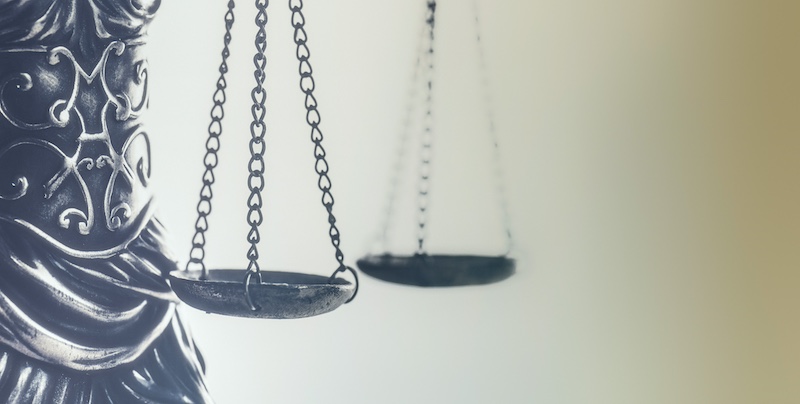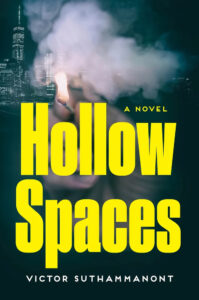Justice is a competition. Between the prosecution and defense. Detectives and criminals. Victims and perpetrators. The powerful and the powerless. Tyrants and the oppressed. Rules and expediency. Integrity and corruption. Punishment and mercy. Between the best and worst in ourselves and our society.
Crime fiction often exposes these tensions in our system and culture. Walter Mosley’s Easy Rawlins solves crimes in a racist Los Angeles. Grace Li’s gang of thieves strikes at colonialism in Portrait of a Thief. Tom Lin’s hitman journeys across the Old West to rescue his wife in The Thousand Crimes of Ming Tsu. Across 29 novels, Lee Child’s Jack Reacher drifts into town to take on bad guys who are too powerful for others to effectively confront.
Part of the satisfaction for us as readers of these stories is the justice served in exposing and remedying, however slightly, the unjust procedural and punishment dynamics in real society. Justice should be applied in a fair process—yet too often we see the privileged receive unfair advantages, while the underprivileged fall victim to structural imbalances. And punishment should “fit the crime,” but still there are those who are over-sentenced and under-sentenced. The appeal of many crime novels is that they, at least superficially, provide simple victories by the hero over unfair processes and punish wrongdoers. For example, not to ruin the end of every Reacher thriller, but the bad guys lose. (And full disclosure, I love them for that.)
But sometimes, even if it looks simple (i.e, the “good guys” win), it is complex. Take, for example, John Grisham’s A Time to Kill. A Black man, Carl Lee, kills two white supremacists who raped his daughter as they are led away after their arraignment. The hero of the story—Carl Lee’s lawyer—fights a racist system and stacked odds, before obtaining the acquittal of Carl Lee based on a “temporary insanity” defense. Readers of the novel and audiences of the movie cheer. Justice is done—Carl Lee is not punished for avenging his daughter despite the racist structure of Mississippi. Simple, right?
But even some slight interrogation reveals grave injustices in the “justice” that satisfies the reader. First, Carl Lee takes it upon himself to be the judge, jury, and executioner. Maybe that’s understandable, but is it the process we want as a society? The two rapists undeniably committed the crime. But they were entitled to due process before being found guilty and punished. Carl Lee himself gets that due process, which results in his acquittal. Setting aside the premediated murder, isn’t it an injustice that Carl Lee robbed the two rapists of the very process he benefitted from? And is death an appropriate penalty for their crimes? Not according to the U.S. Supreme Court, which held in 1977 that the death penalty for rape was unconstitutional. What does it mean that we cheer for this?
As a reader (and author), I love crime fiction—even the simple stories where the good guy saves the day and the bad guy gets what’s coming to him. But, as a lawyer, I spent two decades in the justice system on every side. I worked for a decade in public service at the U.S. Securities and Exchange Commission, where I pursued violations of the federal securities laws, including all manner of frauds, often working with criminal law enforcement. On the defense side, I have represented individuals from a death-row inmate and a man convicted of attempted murder to a woman accused of drug dealing. I clerked for a federal appeals judge advising her on, among other things, appeals from convictions and criminal sentences.
What I learned from those experiences is that very few things are clear cut when you think about them for five minutes. And nothing, whether fiction—limited as it is by scope, the ability of authors, the commercial appetite of publishers and readers—nor the justice system—limited by systemic power imbalances, rules, procedures, and human beings—is capable of capturing the full truth of events and the people in them. It is all reductive so that we can digest what are hopefully the core issues.
Because these stories, fiction or real life, are distilled, we always lose some truth.Because these stories, fiction or real life, are distilled, we always lose some truth. And particularly in the real world where the most fulsome truth is critical, we lose more truth when we discuss complex issues in snippy social-media posts or the sound bites of politicians. Our culture of convenience and limited attention forces us to lose view of the profound implications of the ideas being fed to us. And villains—real ones—are exploiting this dynamic to create a less just society and one of increasing dehumanization with life-altering consequences. Everyone is turned into a caricature.
I had those thoughts in mind when I started writing my novel, Hollow Spaces. Many legal thrillers, A Time to Kill, for example, end with a trial verdict. After all, the trial finds the “truth.” But I knew from my experience that the whole truth is not revealed at a trial—if for nothing else, the rules of evidence limit what is presented to a jury. And often, the court of public opinion renders its verdict despite what happens in the courtroom. So, Hollow Spaces asks the reader to follow John Lo after his acquittal from a murder charge and question whether justice—both in the courtroom and in society—was served. Not to spoil my own book, but it is not an easy question as John’s children find as they try to solve the crime thirty years later. And, as his children recognize when they start their journey, sometimes, the truth is not comforting.
This is not to say that there is not a place for comfort. But we need to be responsible readers and recognize those stories for the fantasy they are. We should recognize that, whatever the allure of the version of justice rendered by Reacher or Carl Lee, there are devastating consequences if we import fictional justice into our society.
Speaking of vigilantism, sometimes the vigilante is the government. The current Administration is claiming the power to summarily deport undocumented immigrants on the basis of unproved crimes in the name of expediency. The Administration is sweeping away what little due process immigrants were entitled to in immigration proceedings (I am not exaggerating to say it was very little) with grave implications for all of us. The government’s position implies it can pick up any of us (including legally present immigrants, permanent residents, or citizens) and send us to detention in a foreign country without a hearing as to whether that is the correct result. There is no justice in this process.
Moreover, the Administration has targeted law firms and universities it views as its “enemies” with punitive Executive Orders for their Constitutionally protected conduct. Every court to consider these Executive Orders has found them to be illegal or stayed their effect due to the irreparable harm they were likely to inflict. In holding an Executive Order targeting a law firm as unconstitutional, a court held that the case “presents an unprecedented attack” on foundational principles of our nation, including fair and impartial trials.
I point these examples out, not merely because I oppose these policies, but because I’d oppose the unjust process even if I agreed with the policy goals. I loved public service and believe in the investor-protection mission of the SEC. I was lucky enough to have had the opportunity to serve my neighbors and influence decisions made for the public good. Yet, immediately following the 2024 election, I decided to resign before the new Administration took over. Donald Trump’s attempts to undermine a fair election at the end of his first term and his rhetoric during the campaign left no doubt in my mind what was to come.
I resigned because I believed I could do more to search for truth and advance the cause of justice outside a Trump Administration. It’s a personal thing. I don’t pretend I can change the world. But I can do my job and serve my clients. And I can find the truths that lead me to the best version of myself. However incrementally, maybe it will make a difference.
Which brings me back to the search for truth and justice in crime fiction, not just by the authors and their characters, but by you, the reader.
As I mentioned above, every story loses some truth in the telling. Seek that truth and fill the gaps. This project—always critical—is urgent today. If I’m lucky enough that you read Hollow Spaces, I encourage you to ask what I left out, what I got wrong, whether you agree with the justice that might be found in that story. Ask yourself why. Ask yourself whether this is the world we want and whether the visions of the world being offered to you are just. Regardless of whether you read my book, please ask yourself these questions of all that you read—even the comfortable stories. You might well find some surprising and some uncomfortable truths buried in yourself.
***


















